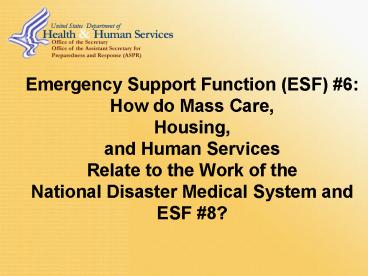Emergency Support Function ESF - PowerPoint PPT Presentation
1 / 29
Title:
Emergency Support Function ESF
Description:
Relate to the Work of the. National Disaster Medical System and ESF #8? 11/17/09. 2 ... Provides casualty information from the affected area in support of a DWI system ... – PowerPoint PPT presentation
Number of Views:490
Avg rating:3.0/5.0
Title: Emergency Support Function ESF
1
Emergency Support Function (ESF) 6How do
Mass Care, Housing, and Human Services Relate
to the Work of theNational Disaster Medical
System and ESF 8?
2
History of the NDMS Transition
- KLL Recommendations
- 57 HHS should lead a unified and strengthened
public health and medical command for Federal
disaster response - 57a HHS should develop a comprehensive plan to
identify, deploy and track Federal public health
and medical assets for use during a catastrophic
event - 57b HHS in coordination with OMB and DHS should
draft proposed legislation for submission to
Congress, to transfer NDMS from DHS to HHS
3
NDMS Transfer
- Department of Homeland Security Appropriations
Act, Public Law 109-295 - Pandemic and All Hazards Preparedness Act, Public
Law 109-417
4
(No Transcript)
5
ASPR
6
(No Transcript)
7
ASPR Mission/Vision
8
ASPR
- Mission
- Lead the nation in preventing, responding to, and
reducing the adverse health effects of public
health emergencies and disasters - Vision
- A nation prepared to prevent, respond to, and
reduce the adverse health effects of public
health emergencies and disasters - ASPR leads Federal public health and medical
response to acts of terrorism or nature and other
public health and medical emergencies - ASPR is the principal advisor to the Secretary on
Public Health and medical emergencies
9
ESF 8 Mission Operating Environment
- Pre-Hospital Triage
- Federal Medical Stations, Facilities of
Opportunity, NDMS facility - Patient Evacuation
- Definitive Care Hospitals, Skilled Nursing
Facilities, Other - Mental Health
- Water
- Food
- Sanitation
- Civil engineering
- Surveillance
- Animals
- Burial
10
Spectrum of Care/Federal Resources
Volunteers
NDMS Hospitals
DMATs
VA/DOD
US Public Health Service
Medical Reserve Corps
Federal Medical Stations
Basic First Aid
Outpatient Care
ICU/Trauma Critical Care
Emergency Departments
Hospital Inpatient Care
Nursing Home Care
Pre-hospital Care
11
(No Transcript)
12
(No Transcript)
13
(No Transcript)
14
Pandemic and All-Hazards Preparedness Act (PAHPA)
- Emergency Medical Services operates at the
intersection of health care, public health, and
public safety and is therefore an integral part
of the medical and public health infrastructure. - -Pandemic and All-Hazards Preparedness Act,
Public Law 109-417
15
HHS support for ESF 6Public Health and Medical
- Provides HHS workers to augment personnel
assigned to shelters - Provides medical care and mental health services
for impacted population either in or outside
shelter locations - Provides casualty information from the affected
area in support of a DWI system - Provides technical assistance for shelter
operations related to food, vectors, water
supply, and waste disposal - Assists in the provision of medical supplies and
services
16
(No Transcript)
17
(No Transcript)
18
(No Transcript)
19
HHS support for ESF 6Human Services
- Provides inter-departmental policy and planning,
as well as program coordination, management, and
oversight to HHS staff responsible for the
provision and coordination of human services
during emergencies - Provides direct assistance to State agencies that
administer emergency human services programs - Provides support within the disaster-affected
areas through the deployment of pre-rostered
assessment teams - Provide SMEs and technical assistance on both
disaster human services issues (i.e., special
needs, at-risk populations, child care, etc.) and
HHS programs that address human services needs
and ways to access those programs
20
(No Transcript)
21
(No Transcript)
22
23
(No Transcript)
24
Social dynamics and disasters
- The response to natural, technological, and
willful hazards and disasters exists in a social
context which is affected by social dynamics and
demographics - development in hazard prone areas or on
environmentally sensitive lands - areas of high density population affect
evacuation and shelter needs - diverse population groups with unique
characteristics - special needs populations
- disproportionate burden of physical,
psychological, and economic impact on vulnerable
populations - panic and problematic behaviors
- quality and quantity of local support systems,
disaster response planning, and infrastructure
25
Human Services Disaster Research
- Collaboration with other disciplines on societal
response to hazards and disasters - Research on crisis related behaviors (individual
and collective) leads to improvements in - early warning systems
- risk communication
- evacuation systems
- community and regional emergency response
disaster planning
26
Public Health and Medical Preparedness and
Response
- Intervention efforts to prevent or reduce the
potential for physical/psychological harm and
social disruption include - early warning systems
- risk communication
- evacuation systems
- community and regional emergency response
disaster planning
27
NDMS Preparedness and Response
- Linkage to NDMS Goals for Patient
Evacuation/Definitive Care - Develop system capability to meet the
transportation needs of special needs
populations - Develop specific processes for patient triage,
tracking, and evacuation utilizing the NDMS
patient movement capability, with involvement of
NGO and private emergency response and air
medical services - Expansion of Definitive Care through addition of
NDMS participating hospitals and other options
for the development of Surge Capacity
28
NDMS Preparedness and Response
- Linkage to NDMS Goals for Training
- Insure readiness for new essential tasks and
expanded mission assignments requiring new skill
sets - Coordinate and integrate individual and unit
training, and maximize joint training with other
state, local, and federal assets - Insure appropriate training inclusive of an
All-Hazards Plus approach that addresses
specific regional issues, hazards, and resources
29
Public Health and Medical Preparedness/PAHPA
- Effective utilization of any available public
and private mobile assets and integration of
other Federal assets. - ..Improving surge capacity through acquisition
and operation of mobile medical assets by the
Secretary to be deployed, on a contingency basis,
to a community event of a public health
emergency and other strategies to improve such
capacity































